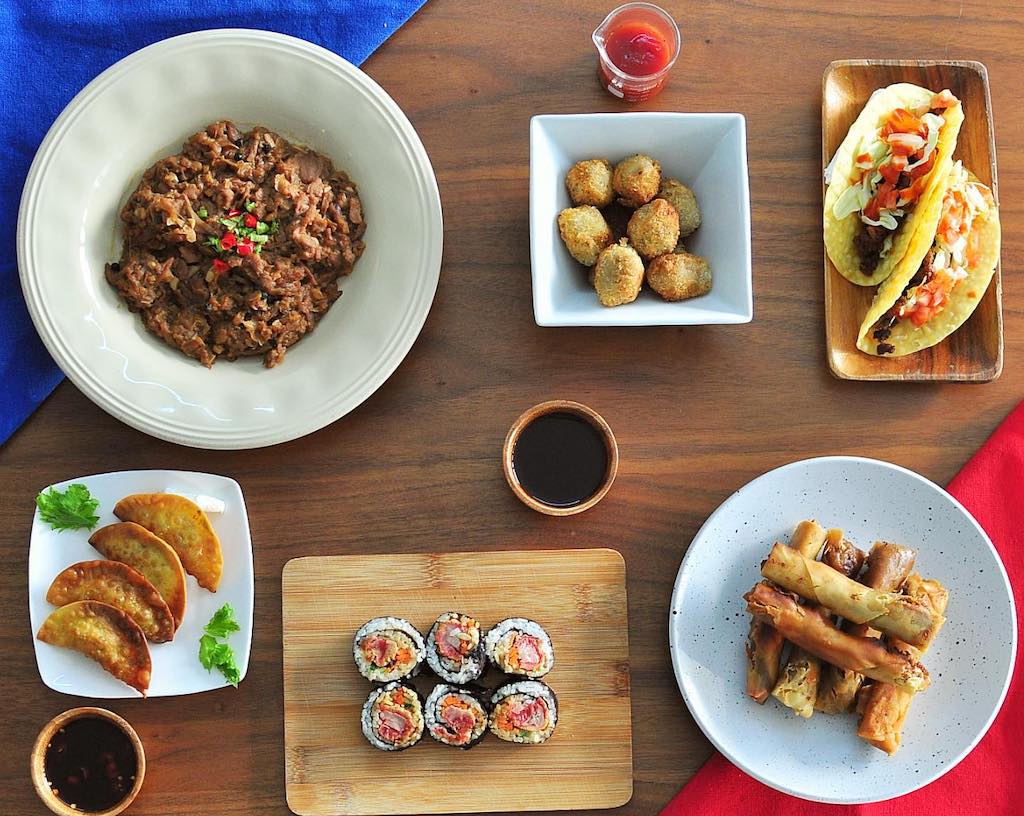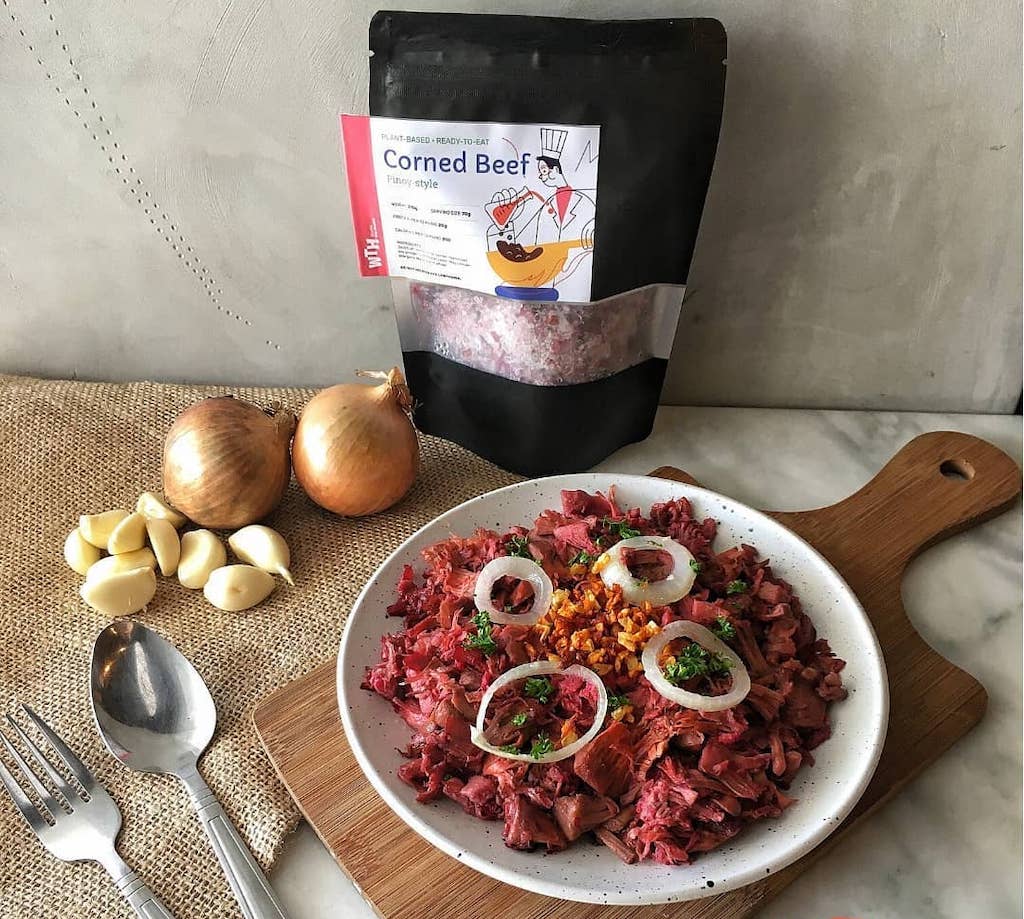7 Mins Read
Stephen Michael Co is the co-founder and CEO of WTH Foods – aka Worth The Health – the first homegrown plant-based meat startup in the Philippines. Having recently joined Big Idea Ventures’ (BIV) latest food tech accelerator programme, the company is set to make waves with its plant-based sustainable meat alternatives that targets the taste buds of Filipinos and the wider Asian market. We recently had the opportunity to sit down with Stephen, who shared with us the story behind WTH Foods, what the young food tech now working on, and what’s in store for the future.
GQ: Could you tell us a bit about your story and how you met your co-founders to start WTH Foods?
SMC: My background is in Biology – I graduated locally in the Philippines ten years ago and undertook my Masters degree in the U.K. in Bioscience Enterprise at the University of Cambridge. When I came back, I thought a lot about expressing science through food. Especially here in the Philippines, there isn’t much funding going into pharmaceutical innovation, so I thought that combining my science background into a food business was ideal. I really wanted to promote Philippine natural resources, people and creativity.
So around five years ago, I found my co-founders Carissa Jane Lim and Carlo Antonio Ng and we started Nipa Brew – it was the heyday of craft beers at the time. Carissa is my childhood friend and I met Carlo, a Chemistry professor, at a beer festival. We all shared the same vision of commercialising science, but Nipa Brew remained a local play. We wanted to expand internationally, but the appeal of craft beers is local and we imported a lot of our ingredients. That’s when we thought that we’re not really showcasing Philippine talent or resources and we started to think about what’s next.

GQ: Tell us about the inspiration that led you to start a plant-based meat company.
SMC: In 2018, the three of us started thinking about our next project. We were chatting with Ryan Bethencourt, an early investor in Nipa Brew back in 2017, and during one chat he told us about Beyond Meat and Impossible Foods and their story. I was also lucky to get a fellowship at the Food Innovation Centre at Rutgers University. When I was there, I tried plant-based burgers and looked at the ingredients and I thought wow – some of these ingredients and plant-based proteins are local to the Philippines and the market for plant-based was starting to grow there too. So we entered this plant-based market in 2019 and began spending a lot of our time mostly researching which plants, legumes and local plants could be developed into our products.
GQ: So are the team and yourself vegans or are you flexitarians?
SMC: No, we’re not yet vegan. We want to go mainstream and we don’t want to just appeal to vegans. So in a way, we’re customers of our own products. We want to reduce our meat consumption and we recognise the fact that in the Philippines, people do eat meat and it’s hard to eliminate meat 100%. But we want to convince people to cut down.
GQ: What are some of the products developed by WTH Foods? Are they all vegan-friendly and what are the key ingredients?
SMC: Our direction is making plant-based Filipino favourites of pantry staples that have been traditionally made up of processed meat. We have a mung bean-based ground meat, a jackfruit-based pulled meat, we have a plant-based corned beef and coming up, we also have a new hot dog product. All of them are completely vegan.

GQ: As the first homegrown plant-based food tech from the Philippines, what makes WTH Foods different from other food tech companies out there? Will you focus on dishes that cater to local cuisine?
SMC: Philippine cuisine has admittedly been lagging behind other Asian cuisines in terms of popularity, but there is a growing trend and recognition of our dishes. We like a weird mix of sweet, sour and mildly spicy – and this is unique. What we want to do is to be at the intersection of the growth of the plant-based market and the growth of Philippine cuisine at the global stage. As you know, there are Filipinos everywhere with over 12 million of us living in over 100 in overseas countries and we want them to be our brand ambassadors as we grow across the world.
GQ: Where is it currently being sold? Is it available directly to consumers or via foodservice?
SMC: So currently, you can order directly from our website and we’re available at 50 specialty grocery stores and retailers in the Philippines. We are in talks with some chefs to use our products in their restaurant menus, but with the ongoing coronavirus pandemic, this is a bit delayed. Our goal is to saturate the Philippine market. We have 7,000 islands here and we are hoping to have a presence in most of the major cities and islands.
GQ: How is WTH Foods currently being funded?
SMC: We are a portfolio company of Big Idea Ventures (BIV) Singapore, so we have investment from BIV and we are actively raising capital as well.
GQ: Some may say that Southeast Asia’s plant-based market is still in its early stages and far smaller than that of the U.S. or Europe. Do you see this changing rapidly with growing demand for plant-based meat?
SMC: I’m fairly conservative but I believe it’s a growing trend. In the Philippines, with the very recent advent of Netflix and documentaries like The Game Changers and What The Health, we saw a really positive uptick in the plant-based trend here. Filipinos are very culturally close to the U.S. in terms of following trends, and although not as much as Hong Kong or Singapore, OmniPork and Beyond Meat have made their presence felt here in the Philippines. Even San Miguel has released a meatless product – though it contains egg, it is vegetarian – so people are seeing plant-based choices in their groceries. The entry of super big companies like these means that there is growth.

GQ: Is the Filipino plant-based market in particular ready, in your opinion? What are consumers in the Philippines looking for – are they price sensitive? What are some of the key obstacles to reaching mainstream consumers in Asia?
SMC: This is a question we think about a lot – how to get our products mainstream. We’re going against a meat industry that has been very efficient and has been decades in the making. Hopefully in the post-pandemic scene, if the trend continues, the Philippines is getting richer and consumers here are having more disposable income. We’re banking on this trend of income growth and education to support the plant-based meat market here. Absolutely, the Philippines is a relatively cheap country. Corned beef, for example, is sold for around US$1, and our own plant-based products are priced around US$4. Of course, Beyond Meat products cost much higher than that, at around US$16. I think to make plant-based meat appeal to the masses here is, of course, taste as the number one. And we’ve been in the F&B market for a while so I believe we know what consumers want in terms of taste. Then it’s price. So price and taste is what consumers are looking for.
GQ: What’s in store for the future for WTH Foods?
SMC: We’re completing a six item line up. We currently have four products and we’re thinking of adding two more that will complete a nice pantry staples collection. We are keen on exploring the Singapore market as a testbed with its diverse population and as a springboard to help us expand across Southeast Asia. What I’m really keen on is following the Filipino community around the world in the U.S., the Middle East and even in Hong Kong, and seeing how they respond to our products. Trying to get them away from their San Miguel hot dog and corned beef will be a challenge, but I’m curious to see if we can make plant-based products as good as their authentic breakfast meals that they miss.
GQ: Final question – team rice or team noodles?
SMC: I’m a fan of rice!
Lead image courtesy of WTH Foods.



